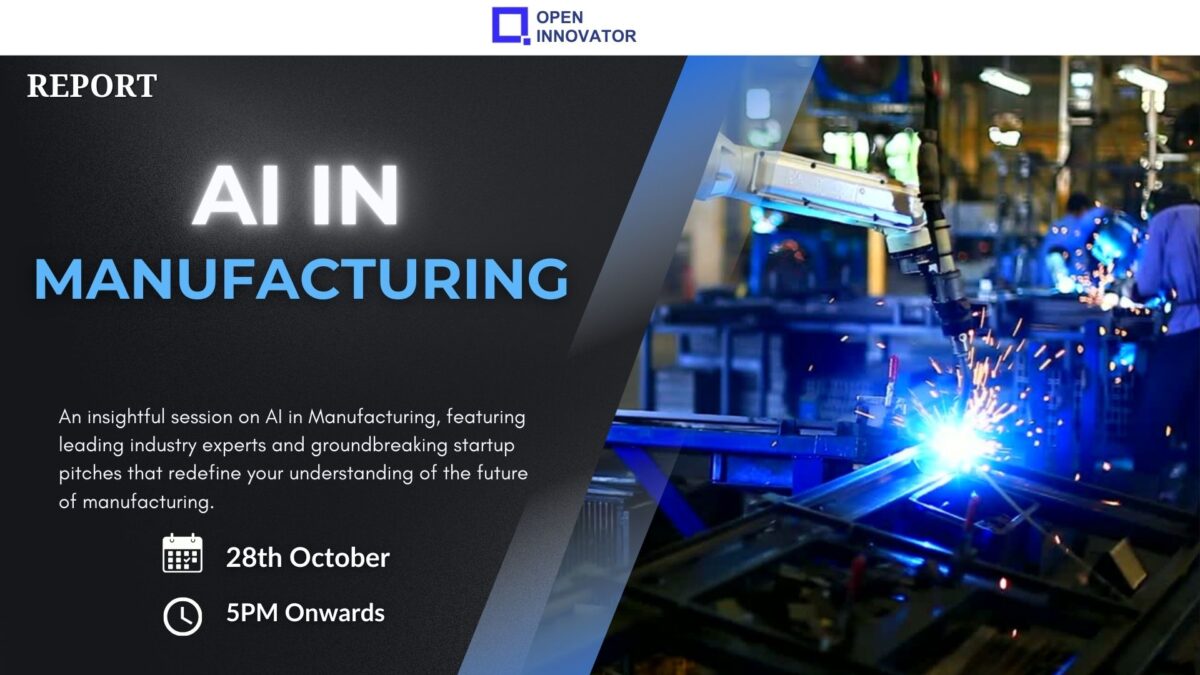OI session, AI in Manufacturing, was held on October 28th, the leaders discussed how artificial intelligence (AI) is drastically changing the manufacturing industry by improving operating efficiency, anticipating equipment problems, and streamlining production processes. The several uses of artificial intelligence (AI) in manufacturing, with particular attention paid to generative AI, predictive maintenance, and the combination of AI with information technology (IT) and operational technology (OT) were discussed. The discussion also included obstacles to the adoption of AI, such as moral dilemmas and the requirement for human participation in decision-making.
The leaders that participated at the event,are:
• Jemin Tanna, Digitization R&D Head at Siemens Industrial Automation, Generative AI and Startup Focus
• Achyut Chandra, Manager and Lead at HCL’s Open Innovation vertical, integrating startup solutions into large enterprises
• Harini Gorla, Associate Director / Senior Principal Enterprise Architect, GSK
• Ramachandran S, Principal Consultant in the thought leadership unit at Infosys Knowledge Institute, leading engineering, manufacturing, sustainability, and energy transition initiatives
This session also featured exclusive startup pitches from the country’s hottest innovators in the field.
• Energy ETA: An IoT-AI enabled platform that combines proprietary hardware, communication, and software to deliver reliable, secure, and sustainable digitization, Founder- Jagjit Singh
• Visionbot: Pioneers of plug-and-play visual inspection, driving unmatched efficiency and accuracy for businesses; Founders – Amit C. Prabhu Prakash Michael McCoy
• SyskeyOT Cybersecurity: Purpose-built OT/ICS cybersecurity, safeguarding critical assets with seamless protocol integration and enhanced visibility, Founder- Rajendran Chellamuthu
The Role of AI in Revolutionizing Manufacturing
Introduction
The use of AI technology is poised to bring about a significant change in the manufacturing sector. AI is expected to boost the global manufacturing industry by about $4 trillion a year by 2030.
Key Applications of AI in Manufacturing
1. Predictive Maintenance
Predictive maintenance is made possible by AI technologies, which analyze data from operations and equipment to anticipate breakdowns before they happen. This strategy enables businesses to reduce maintenance expenses and downtime, which eventually results in significant savings. For supply chain inefficiencies like the bullwhip effect to be accurately identified, data from several sources must be integrated.
2. Generative AI in Design
Manufacturers may produce numerous design iterations that strike a balance between performance and aesthetics because to generative AI’s significant advantages in product design. Demand forecasting and product end-of-life management, including robotic recycling, are just a few of the operations that this technology may help with. However, copyright and ethical issues are brought up by the use of generative AI, which calls for human oversight.
3. AI and Automation Integration
The efficiency of manufacturing is increased by combining automation technologies with AI. Finding appropriate AI solutions requires a cooperative strategy that encourages departmental cooperation. Applications of AI can be found in the aftermarket industry and prototype creation, offering chances for cost savings and increased operational effectiveness.
Challenges of AI Adoption
1. Ethical and Legal Concerns
AI adoption in manufacturing is hampered by issues with prejudice, ethics, and intellectual property rights. Fostering a culture of responsible AI use requires addressing these problems. In the age of Industry 5.0, where AI technologies should support human labor rather than replace it, the human element is still crucial.
2. Skills Gap
There is a skills gap in the manufacturing workforce as a result of the quick development of AI technologies. Upskilling staff members to improve their capacity to collaborate with AI systems must be a top priority for businesses. Training in AI that prioritizes explainability and the democratization of AI across all organizational activities should be part of this reskilling initiative.
Strategies for Successful Implementation
1. Focus on Measurable Outcomes
Instead than just implementing various AI models, organizations should focus on attaining quantifiable results. This emphasis will guarantee that AI projects complement corporate goals and yield observable advantages.
2. Collaboration with Startups
Established manufacturers can investigate novel AI technologies and jointly create value by collaborating with creative startups. Specific issue statements should be the focus of collaborative partnerships so that each party can contribute as much as possible and get as much information as possible.
3. Bridging IT and OT
Effective use of AI in manufacturing requires the confluence of IT and OT. A more unified approach to AI deployment will be made possible by this combination, which will also improve cybersecurity and operational effectiveness.
Success Stories
Leading the way in offering AI-powered manufacturing solutions are a number of firms. Businesses that specialize in cybersecurity for OT environments, for example, are tackling security flaws brought on by the confluence of IT and OT. To protect industrial networks, they offer asset detection solutions and log management systems.
Additionally, operational procedures are being optimized through the deployment of AI models that apply reinforcement learning, which increases energy savings and boosts overall efficiency.
Takeaway
AI has the ability to completely transform industry by increasing output, cutting waste, and stimulating creativity. However, resolving ethical issues, closing the skills gap, and guaranteeing that human expertise continues to play a crucial role in decision-making are all necessary for the successful deployment of AI technologies. To fully utilize AI and bring about significant change in the sector, manufacturers must place a high priority on cooperation, ongoing education, and strategic alliances.
By doing these things, businesses can make sure they stay viable and competitive in a world that is becoming more automated and AI-driven.






